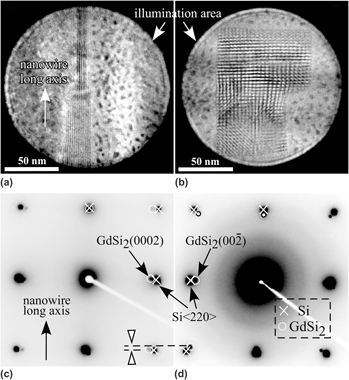Article contents
Phase transformation in self-assembled Gd silicide nanostructures on Si(001)
Published online by Cambridge University Press: 30 June 2011
Abstract

Gd silicide nanostructures epitaxially grown on Si(001) are studied by plan-view transmission electron microscopy and associated nanobeam electron diffraction, as well as scanning tunneling microscopy. The nanobeam diffraction measurements show a direct correlation between the nanostructure morphology, either nanowires or islands, and the silicide crystal structure. Scanning tunneling microscopy shows a phase transformation from nanowires to islands that nucleate at nanowire intersections. A specific mechanism for this transformation is proposed that explains nanowire growth behavior previously observed on vicinal Si surfaces.
- Type
- Articles
- Information
- Journal of Materials Research , Volume 26 , Issue 17: Focus Issue: Nanowires: Fundamentals and Applications , 14 September 2011 , pp. 2276 - 2281
- Copyright
- Copyright © Materials Research Society 2011
Footnotes
Present address: Nanolab Technologies, San Jose, California 95134
References
REFERENCES
- 3
- Cited by


